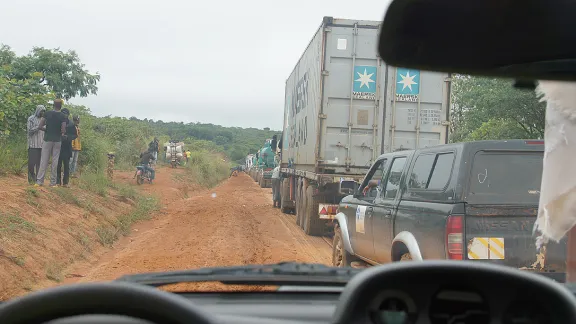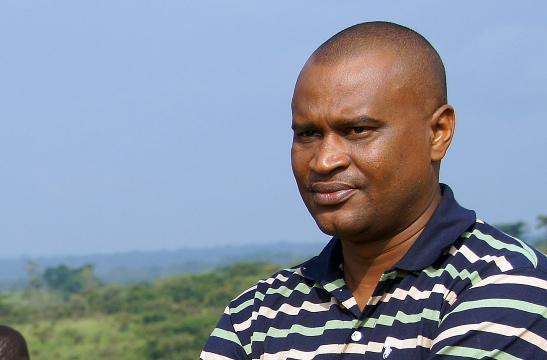
The rainy season makes access to remote areas in CAR much more difficult. Photo: LWF/P. Mumia
Meet one of the 2500 Humanitarian Heroes at the forefront of the LWF’s emergency response. On World Humanitarian Day (19 August) we pay special tribute to their commitment to assist - often at great personal risk - those facing violence, displacement, hunger, and lack of basic human rights.
Why did you become a humanitarian worker?
I chose humanitarian assistance in order to help to save lives in emergencies or in difficult situations.
Tell us a little bit about the work you do.
I support the office with the necessary documentation and logistical material to help in the planning and proper functioning of the program.
This includes providing staff with information on safety and security, conducting staff training sessions and briefings on safety, securing office accommodation and controlling and maintaining safety standards for vehicles and other office equipment.
What's the most rewarding part of your work?
I also worked for UNICEF in CAR a few years ago. After the distribution of mosquito nets in a village in the northern part of the country, a person who had received the items we had distributed approached me to thank me.
In my work, I also find it rewarding that I have the time to also discuss issues with the people we support.
What are some of the more challenging aspects of your work?
Logistics and security make humanitarian response happen; without these two key aspects, a humanitarian response program cannot advance.
The contexts are difficult for reasons of insecurity, and access to the displaced people is often difficult in remote areas from a logistics point of view.
When we prepare a mission to such places, we must consider the security situation as any incident can always make it difficult to access the intervention area or delay the program plans.
Sometimes, armed militias attack humanitarian convoys and workers, take away the assistance materials, or ask NGOs to pay fines or fees to facilitate passage: this makes our work very difficult.
This can become very frustrating, because the material to be distributed gets stuck, and the staff cannot do anything about it.
The challenge is to get all those involved in this crisis to agree to lay down their arms, to stop violence against Muslim and Christian communities, and to find a common ground on which they can agree to mutual dialogue and to forgive each other. Humanitarian organizations can help set up awareness campaigns to promote peace among the respective populations.
What is the most memorable moment you’ve experienced during your work?
I was on a mission to northern CAR to identify and distribute school kits. We wanted to raise awareness among the parents about the need to send all their children to school, especially girls, because girls are also an important part of the community.
Upon our arrival in a village, the people came towards us, and we explained the purpose of our visit. We explained that girls can also become professionals just like the boys.
In the end we were very encouraged by the community’s response and their willingness to make sure that girls too attend school. We distributed school kits, and the children were very happy.
What does Humanitarianism mean to you?
Emergency support in an exceptional crisis.
#WHD2014 #HumanitarianHeroes



